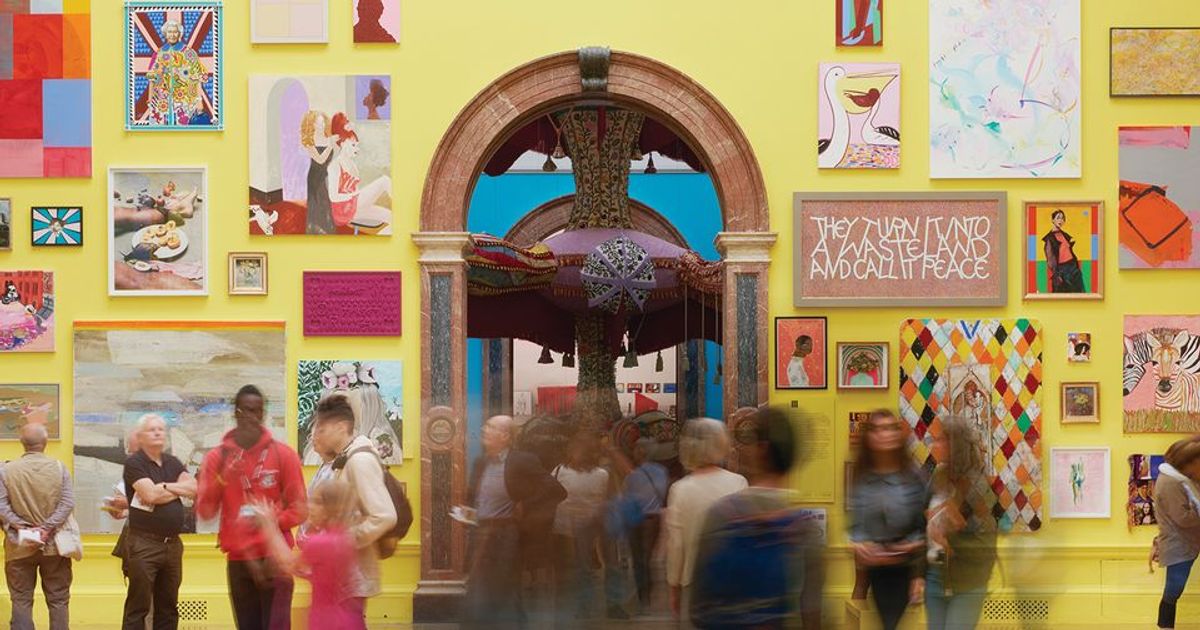ART WORLD NEWS
England’s Freedom Day has arrived—and museums are fighting to keep crowds at bay
The 250th Summer Exhibition at London’s Royal Academy of Arts
James Harris
As “freedom day” dawns in England and Scotland moves to “level zero” of Covid-19 restrictions, museums are putting safety first and extending their own crowd-control measures beyond 19 July.To the alarm of international scientists, Boris Johnson’s government has today removed most of the legal restrictions imposed to curb the spread of the virus in England. Nightclubs can reopen as limits on social gatherings and event capacity have been lifted. Face coverings are recommended “in crowded areas” but are no longer required by law. England’s unlocking comes despite soaring daily infections, which on Friday and Saturday topped 50,000 for the first time in six months. Meanwhile, Scotland enters its lowest level of restrictions on 19 July, with First Minister Nicola Sturgeon emphasising the need for “continued caution” and “a gradual approach”. Physical distancing rules move from 2m down to 1m, while face masks remain mandatory “not just now but, in all likelihood, for some time to come”, Sturgeon said. Up to ten people from four households can now meet in indoor public places and events are capped at 400 people indoors and 2,000 outdoors. The devolved Scottish government is due to end almost all restrictions on 9 August.Having emerged from months of lockdown on 26 April in Scotland and 17 May in England, museums and non-commercial galleries are still suffering from the financial fallout of the pandemic. Reduced visitor numbers have led to major losses in income. But cultural attendance is unlikely to rebound to pre-pandemic levels this summer, as leading institutions strive to maintain a Covid-safe experience that keeps crowds at bay. “Whilst attractions, like all other businesses and parts of the economy, are keen to fully reopen as soon as possible, and to recover the economic losses of the last 16 months, they have put the safety of the visitors and their staff before all other considerations,” says the Association of Leading Visitor Attractions (Alva). The advocacy group represents more than 2,200 members among top UK cultural attractions, including museums, heritage sites, cathedrals, gardens and zoos.Online research commissioned by Alva and undertaken by the consultancy Decision House found that 75% of nearly 900 UK attraction visitors polled on 17-22 June were “not yet ready for social distancing and other measures to be removed or eased even if the government allowed easing to occur”. Consequently, Alva advises cultural operators to retain capacity limits, pre-booked timed entry, social distancing rules and face masks until the end of August, when they can be reviewed. “Nearly all our members will be continuing with these measures and will adapt them for their own circumstances and sites,” says Bernard Donoghue, Alva’s director. “The most important issue, for all visitor attractions, is that they continue to provide a safe, comfortable and enjoyable visitor experience… and a safe and comfortable working environment for their staff and volunteers.”Numerous UK museums and galleries confirmed to The Art Newspaper that they will continue their existing Covid-19 safety measures with minimal changes after 19 July. They include the National Gallery and British Museum in London; the Tate galleries in London, Liverpool and St Ives; the Henry Moore Foundation in Leeds and Hertfordshire; Baltic Centre for Contemporary Art in Gateshead; National Museums Scotland; National Galleries of Scotland in Edinburgh; and Glasgow Museums.Alva’s research corresponds with “our own anecdotal evidence”, says a spokesperson for Glasgow Life, which operates the city’s museums, as “visitors [tell] us that they feel more comfortable coming to our museums knowing that we’re maintaining these measures for the time being”.Visitors to popular London destinations such as the National Gallery, British Museum, Tate Modern and Tate Britain are still recommended to pre-book a time slot online to guarantee entry, but daily walk-up tickets will now also be available. However, Baltic in Gateshead says it will revert to drop-in visits without advance reservations, managing busy periods with “a short wait for visitors to enter certain spaces where there are lower capacities”, says the director, Sarah Munro.Many museums plan to increase admissions gradually based on feedback from the public. “Though we will not be enforcing social distancing, our priority is a safe experience for all. We will manage capacity carefully so visitors can maintain their preferred distance from others,” a National Gallery spokesperson says. Some venues, including the British Museum and the National Galleries of Scotland, are also relaxing requirements for the public to follow a one-way route through the building.Even if measures are no longer legally enforceable, visitors are nevertheless “encouraged” to wear face coverings indoors and to check into venues using the NHS (National Health Service) contact tracing app. At the Henry Moore Foundation’s two sites in Leeds and Hertfordshire, “free masks will be available to those who don’t carry them”, says the director, Godfrey Worsdale. “Of course, as mask wearing will no longer be the law, we cannot insist on this, however we would invite all our visitors to consider the safety and experience of others and comply with our advice.” The foundation will revise its limits on visitor numbers in September, he adds.In line with Scotland’s stricter government policy, museums in the country will only increase capacity slightly to comply with 1m physical distancing rules, and face coverings remain mandatory. Wales is due to move to its alert level zero of Covid-19 restrictions on 7 August, removing limits on the number of people who can meet indoors, though face coverings will remain a legal requirement in most indoor public places until further notice. Northern Ireland’s government will this week review plans to relax restrictions on 26 July, including reducing social distancing to 1m indoors only and allowing theatres and concert halls to reopen with seated audiences.
Source link













